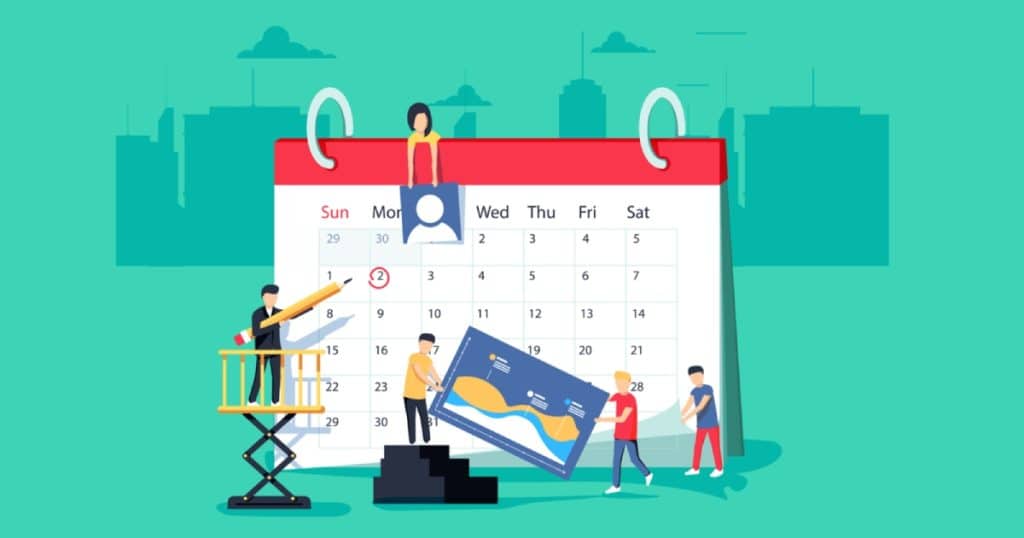A content calendar is a planning document that helps you organize and schedule your content. It can include information about your content topics, target audience, publication dates, and distribution channels. Having a content calendar can help you ensure that your content is well-planned, consistent, and effective.
- Why Use a Content Calendar?

A content calendar is a tool that can help you to organize and plan your content. It can help you to stay on track with your content goals, and make sure that your content is consistent and well-planned.
There are a few key benefits of using a content calendar:
1. It Helps You Plan Ahead
When you have a content calendar, you can plan your content in advance. This way, you know what you’re going to write about and you can make sure that your blog posts are well-timed and well-planned. This allows you to be more strategic with your content, and ensure that your blog posts align with your overall content goals.
For example, you can plan out a series of blog posts that cover a specific topic in depth, or schedule your posts to coincide with upcoming events or holidays. Having a plan in place also helps you to stay on track, so you can avoid the last-minute scramble to come up with content ideas.
2. It Keeps You Organized
A content calendar also helps you stay organized. It allows you to schedule your blog posts in advance, so you can make sure that your content is spaced out evenly. This ensures that you’re not publishing too many posts in a short time, which can overwhelm your audience. It also allows you to see the overall flow of your content and make adjustments as needed.
For example, you can use the calendar to identify gaps in your content and plan new blog posts accordingly. Additionally, you can use it to keep track of your editorial calendar, assignments, deadlines and also to collaborate with other team members.
3. It Helps You Stay on Track
A content calendar can help you stay on track with your content goals. It allows you to map out your content in advance and ensures that you’re publishing the right types of content to reach your target audience. This helps you stay focused on your content goals and ensures that you’re not wasting time on content that doesn’t align with your overall strategy.
For example, if your goal is to increase brand awareness, you can schedule a series of blog posts that focus on your brand’s mission and values. Similarly, if your goal is to generate leads, you can schedule a series of blog posts that focus on lead magnets and call-to-action.
4. It Helps You Measure Success
A content calendar can also help you measure the success of your content. It allows you to track the performance of your blog posts, and see which ones are getting the most traffic and resonating with your audience the most. This allows you to make data-driven decisions about your content, and optimize your strategy for better results.
For example, if a certain type of blog post is consistently getting more engagement and shares than others, you can create more content similar to that post. On the other hand, if a certain post is not performing well, you can adjust your strategy and focus on creating more engaging and compelling content.
5. It Keeps Your Content Fresh
A content calendar can help you ensure that your content is always fresh. It allows you to plan out your content in advance, so you never run out of ideas and always have new content to share with your audience. This keeps your content interesting and engaging and helps you maintain a loyal following. Additionally, planning your content in advance allows you to be more creative and come up with new and interesting ideas that you might not have thought of otherwise.
6. It Helps You Improve Your Writing
A content calendar can also be used to improve your writing. It allows you to plan out your content in advance, and ensure that your blog posts are well-written, engaging, and on-topic. This can help you become a better writer over time, and improve the overall quality of your content.
By having a plan in place, you can also make sure that you have enough time to research, write, and edit your content, which results in a more polished and professional final product. Additionally, by scheduling your blog posts in advance, you can take the time to focus on specific writing skills or techniques that you want to improve, such as structure, tone, or grammar.
7. It Saves You Time
Lastly, a content calendar can save you time. It allows you to plan out your content in advance, so you don’t have to spend hours brainstorming ideas or coming up with topics to write about. This allows you to focus on other important tasks, and be more productive overall.
Instead of spending your time coming up with new ideas, you can use that time to research, write, and edit your content, or to focus on other aspects of your business or blog. Additionally, having a content calendar in place can help you streamline your workflow, and make it easier to stay on top of deadlines and assignments.
- How to Create a Content Calendar:

A content calendar is an important part of any content marketing strategy. It helps you plan and organize your content, keep track of deadlines, and track performance. Here’s how to create a content calendar:
1. Decide on your content goals.
What are you trying to achieve with your content? Do you want to increase website traffic, boost brand awareness, or generate leads? Once you know your goals, you can tailor your content to achieve them.
2. Brainstorm content ideas.
Once you know your goals, it’s time to brainstorm content ideas. Start by thinking about the topics your target audience is interested in, and brainstorming ideas for blog posts, infographics, videos, etc.
3. Create a content calendar.
Now it’s time to put everything together in a content calendar. This will help you plan and schedule your content, and make sure you’re hitting your goals.
4. Track performance.
Once you have a content calendar in place, it’s important to track performance. This will help you determine which content is performing well and which content needs to be tweaked.
Creating a content calendar can be a great way to help you organize and plan your content. It can also help you track deadlines and ensure that all content is published on schedule.
Related articles To Crafting your Content:
 Anas is our go-to copywriter with a knack for crafting persuasive and high-converting eCommerce landing pages. His passion for words and understanding of consumer psychology helps turn visitors into loyal customers. When he's not refining his copy, Anas enjoys exploring the latest digital marketing trends and experimenting with new writing techniques. His blend of creativity and strategic thinking makes him an indispensable part of our energetic team.
Anas is our go-to copywriter with a knack for crafting persuasive and high-converting eCommerce landing pages. His passion for words and understanding of consumer psychology helps turn visitors into loyal customers. When he's not refining his copy, Anas enjoys exploring the latest digital marketing trends and experimenting with new writing techniques. His blend of creativity and strategic thinking makes him an indispensable part of our energetic team.












